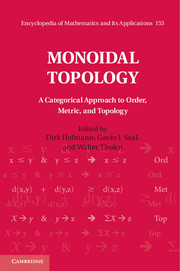Preface
Published online by Cambridge University Press: 05 August 2014
Summary
Monoidal topology describes an active research area that, after many proposals throughout the past century on how to axiomatize “spaces” in terms of convergence, started to emerge at the beginning of the millennium. It provides a powerful unifying framework and theory for fundamental ordered, metric, and topological structures. Inspired by the topological concept of filter convergence, its methods are lax-algebraic and categorical, with generalized notions of monoid recurring frequently as the fundamental building blocks of its key notions. Since the main components of this new area have to date been available only in a scattered array of research articles, the authors of this book hope that a self-contained and consistent introduction to the theory will serve a broad range of mathematicians, scientists, and their graduate students with an interest in a modern treatment of the mathematical structures in question. With all essential elements from order and category theory provided in the book, it is assumed that the reader will appreciate a framework which highlights the power of equationally defined algebraic structures as particularly important elements of the broader lax-algebraic context which, roughly speaking, replaces equalities by inequalities.
There are two principal roots to the theory presented in this book: Barr's 1970 relational presentation of topological spaces which naturally extends Manes' 1969 equational presentation of compact Hausdorff spaces as the Eilenberg–Moore algebras of the ultrafilter monad, and Lawvere's 1973 description of metric spaces as (small individual) categories enriched over the extended non-negative real half-line.
- Type
- Chapter
- Information
- Monoidal TopologyA Categorical Approach to Order, Metric, and Topology, pp. xv - xviiiPublisher: Cambridge University PressPrint publication year: 2014

